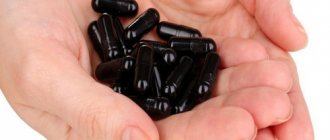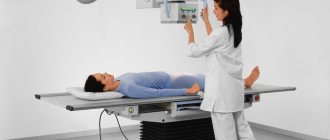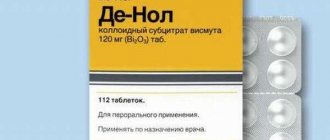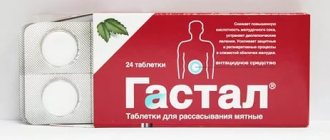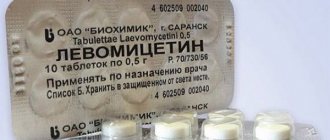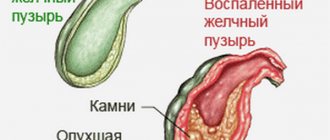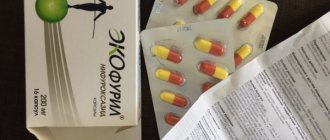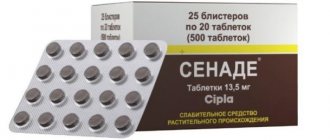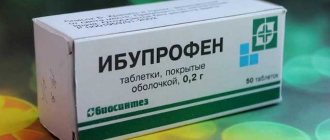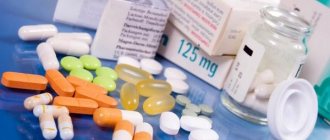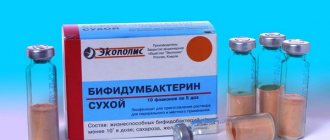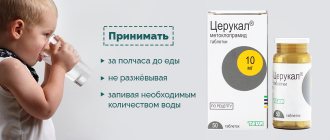More information about the drug "De-nol"
“De-nol” is used for diagnosing chronic gastritis or gastric ulcers in the acute stage, for irritable bowel syndrome, prolonged diarrhea, dyspeptic disorders of various origins, for the prevention of gastrointestinal diseases.
The prescription of “De-nol” is made exclusively by a doctor, since the drug cannot be used for all types of gastritis, for example, the medicine is not prescribed for acute gastritis.
The drug "De-nol" is available in the form of film-coated tablets. The active ingredient in De-nol is bismuth tripotassium dicitrate. De-nol has a strong enveloping, anti-inflammatory, astringent, and antiseptic effect.
The high effectiveness of the drug lies in its ability to accelerate the recovery process. When using De-nol, the mucous membrane is quickly restored, and damaged areas acquire an almost original appearance.
What does the medicine affect? When taking the drug, many processes occur:
- compaction of the top layer of areas damaged by erosion;
- activation of the regeneration process;
- protection of the walls of the digestive tract from the negative influence of an aggressive environment (acid, bile, enzymes);
- reducing the acidity of gastric juice and regulating the production of hydrochloric acid;
- reduction of pain and inflammatory reaction in the damaged area;
- elimination of dyspeptic symptoms: heartburn, nausea and belching;
- reducing the number of relapses and exacerbations.
How does the mechanism of action occur? When the tablet enters the stomach, it begins to act - it reacts with gastric juice, and the process of precipitation of insoluble bismuth salts occurs, which interact with proteins and form foamy compounds on the surface layer of the organ mucosa.
A protective whitish film forms on damaged areas of the mucosa, which remains for several hours. This process prevents the negative effects of aggressive biological substances - hydrochloric acid, bile, enzymes - on the intestinal and gastric mucosa with increased acidity.
The drug stimulates the production of prostaglandids, which promotes the growth of the synthesis of mucin (mucus) and other compounds that improve the properties of gastric secretions. In places of erosion, restoration processes are stimulated. “De-nol” is resistant to the influence of hydrochloric acid, which means it reliably protects the body and does not require additional exposure.
In addition, the medicine has a very important property: antibacterial, which is very important provided that the causative agent of the disease is the bacterium Helicobacter pylori.
Description of the drug Venter
The drug Venter is used in the treatment of erosions in the stomach and ulcers; the drug accelerates the healing of damage and prevents relapses. An important advantage of the drug is that it does not have a systemic effect, showing activity only within the gastrointestinal tract.
The drug forms a protective coating at the site of ulceration, preventing further negative effects on the site of damage by gastric juice and digestive enzymes. Indications for use:
- treatment of ulcerative lesions of the stomach and duodenum;
- to prevent the appearance of ulcers;
- if long-term use of non-steroidal anti-inflammatory drugs is necessary.
In what cases is De-nol taken?
This medicine is applicable for the following diseases and pathologies:
- exacerbation of chronic hyperacid, erosive and atrophic gastritis;
- hypertrophic gastritis, duodenitis and gastroduodenitis;
- stomach and duodenal ulcers;
- inflammation caused by bacteria;
- gastritis accompanied by reflux esophagitis;
- dyspepsia (in the form of a syndrome);
- irritation of the colon (in the form of a syndrome);
- Ellison's syndrome.
De-nol is also used for prophylactic purposes to prevent relapses of gastritis and ulcers. In addition, there is a list of other diseases for which De-nol is allowed to be used.
Doctors' opinions and patient reviews
Alexander, 49 years old, gastroenterologist, Moscow: “I often use the drug Venter in my practice. It has antacid and enveloping properties, forming a protective film on the gastric mucosa. I prescribe it to patients with gastritis and gastric ulcers. It rarely causes side effects, unlike other analogues, for example, Omez.”
Dmitry, 55 years old, gastroenterologist, Yaroslavl: “I often prescribe the drug De-Nol to my patients along with antibiotics, because this combination allows you to get rid of Helicobacter in 99% of cases. It is prohibited to take it on your own, because due to incorrectly selected dosage and long-term therapy, kidney failure may develop.”
Olga, 33 years old, Kazan: “The drug Venter literally saved me, because in the acute stage of a stomach and intestinal ulcer it lasted until the last minute. I went to see a doctor who prescribed a strict diet, the auxiliary enzyme Creon and the gastroprotector Venter. I took the last drug 30 minutes before meals 4-6 times a day. The treatment lasted 4 weeks. Relief came on the 4th day, and a week later the painful spasms and heaviness went away.”
Victor, 25 years old, Samara: “At the age of 23, the doctor diagnosed me with gastritis, the cause of which was Helicobacter. The doctor prescribed the drug De-Nol, which had to be taken for 4 weeks. In the first week everything was fine, but in the second week a copper taste appeared in the mouth, dark inclusions were observed in the stool, and appetite disappeared. These side effects were expected. By the beginning of the fourth week, the condition returned to normal, and after the end of treatment, the gastritis completely disappeared.”
How to drink "De-nol" for gastritis
Instructions for use for gastritis stipulate at what age and how to take the drug. The use of "De-nol" is allowed for children over 14 years of age. In addition, in special cases this drug is prescribed to young children.
It is prohibited to give the drug to a child on your own without a doctor’s prescription, since bismuth is classified as a heavy metal, and it has a toxic effect if used incorrectly.
"De-nol" for gastritis is taken, as a rule, as part of complex therapy. Along with it, when prescribing therapy, proton pump inhibitors, antacids or drugs that improve motility are prescribed.
For concomitant diarrhea, antidiarrheal drugs are prescribed, and for constipation, medications that have a laxative effect are prescribed.
The presence of Helicobacter pylori means supplementing De-nol with one or more antibiotics that affect this microorganism.
For the most effective effect of the drug, you must adhere to the following rules and methods of administration:
- Do not chew or crush the tablets;
- It is allowed to take tablets only with settled, clean or boiled water;
- while taking the drug or immediately after it, it is not recommended to consume milk, dairy and fermented milk products - this reduces the effectiveness of treatment with De-nol;
- after taking the product, you should not eat food, drink fruit juices, compote, tea, coffee, or alcoholic beverages;
- “De-nol” is consumed half an hour before meals; after consuming the drug, you should not take other medications for 30-40 minutes;
- after completing the course of therapy, for several months you should not use other products containing bismuth as an active substance, in order to avoid its accumulation in the tissues of the body;
- During treatment with De-nol, the daily doses of the drug prescribed by the treatment regimen should be followed so as not to provoke side effects.
The duration of the course of treatment is determined individually by the doctor, usually its duration is from one month to two.
The therapeutic dosage of the drug depends on the exact diagnosis, the patient’s age, and body weight (in children).
It is recommended to take one dose at night; for convenience, the daily dose can be divided into two doses (morning and evening). The average duration of the treatment course is 2-4 weeks.
Before starting to take the medicine, the doctor recommends changing your diet and daily routine: the patient should sleep 8 hours a day and eat at the same time strictly in accordance with the “Table No. 2” diet 4-5 times a day. At the same time, junk food, too hot or too cold dishes are prohibited.
Typically the following dosage is used:
- from 4 years old. The dosage is prescribed depending on the patient’s weight (8 mg/kg) and is taken in 2 doses, the child drinks 4 mg/kg at a time.
- from 8 years: take one tablet in the morning and evening.
- over 12 years old. Taking into account the stage of the disease and body weight, 3-4 tablets are prescribed. When prescribing 3 tablets, it is better to take them in the following way - drink 2 in the morning and 1 at night, when prescribing 4 tablets - distribute the dose evenly and drink 2 tablets at a time.
- adults - 1-2 tablets with each meal (half an hour before eating).
Venter
The drug Venter contains aluminum complex and sucralfate as active ingredients. Sold in the form of granules or tablets of 1 g.
Medicinal properties
Venter accelerates the healing of ulcers and prevents the development of relapses. Does not have a systemic effect. Forms a protective coating at the site of the ulcer, preventing the action of bile salts, gastric juice and pepsin on the affected necrotic areas. Pepsin activity is reduced by a third.
Accelerates the treatment of duodenal and gastric ulcers, and is used for moderate and minor inflammation of the esophagus. Prevents the formation of ulcers as a result of stress. The main part of the drug is excreted, unabsorbed, in feces.
Indications and contraindications
Treatment with Venter is indicated as part of complex therapy and prevention of exacerbations of peptic ulcers of the duodenum and stomach. It is used for damage to the mucous membranes of the gastrointestinal tract caused by stress or long-term treatment with non-steroidal anti-inflammatory drugs.
During treatment with NSAIDs, Venter can be used to prevent their negative effects on the mucous membranes.
Indicated in the treatment of gastroesophageal reflux disease, as well as in patients with uremia on hemodialysis in whom hyperphosphatemia is reduced.
Contraindications to treatment with Venter are:
- hypersensitivity;
- severe renal failure;
- Alzheimer's disease;
- common constipation, chronic diarrhea;
- severe abdominal pain of unknown cause;
- hypophosphatemia.
Venter is prohibited for children under 14 years of age and is not recommended for use by pregnant and lactating women.
Drug interactions
Venter may reduce the absorption of the following medications:
- tetracycline;
- ranitidine;
- cimetidine;
- fluoroquinolones;
- theophylline;
- warfarin;
- ketoconazole;
- quinidine;
- digoxin;
- phenytoin;
- thyroxine.
The listed drugs are taken at least two hours before taking Venter. Simultaneous use with citrates and aluminum hydroxide may lead to an increase in the concentration of aluminum in the blood.
Adverse reactions
Venter can cause adverse reactions such as vertigo, drowsiness and dizziness. On the part of the digestive tract, constipation, diarrhea, vomiting, nausea, flatulence, and dry mouth mucous membranes are noted.
There may be a decrease in the level of phosphorus in the blood with long-term therapy, and in patients with a diet containing little phosphorus, there is a high risk of developing osteomalacia and hypercalciuria.
Allergic reactions are manifested by skin rashes, itching and hives. Lower back pain may be felt.
Contraindications, overdose, side effects
It is necessary to take De-nol correctly to avoid side effects. Using De-nol according to the instructions, following the dosage and rules of administration help to avoid adverse reactions.
The following reactions can be observed as side effects:
- itchy skin, urticaria;
- inflammation and swelling of the gums, blackening of the tongue;
- failure of the kidneys;
- nausea, sometimes with vomiting, constipation, alternating with diarrhea;
- unpleasant taste and odor from the mouth after using the medicine;
- acquisition of black stool;
- attention and memory disorder (in rare cases);
- encephalopathy is possible, which is caused by the accumulation of bismuth in the body (with long-term use of the drug).
Gastrointestinal manifestations can occur frequently, but are usually temporary and do not require additional treatment, as they resolve on their own.
If symptoms of allergic reactions or encephalopathy appear, stop taking the drug and consult a doctor.
Pregnancy and breastfeeding are considered contraindications. If the situation requires the nursing mother to take the drug, breastfeeding must be stopped.
Other contraindications include: the presence of severe renal dysfunction, intolerance or hypersensitivity to the components of the drug, recent use of drugs with the same active substance or a similar effect.
When the treatment regimen contains, in addition to De-nol, antacid drugs to get rid of heartburn, De-nol is taken separately from them, since such drugs reduce the effect of its effect. For the same reason, it is forbidden to drink milk at the same time as taking the drug.
Kidney damage is possible if a very large dose is taken (10 or more times the permitted dose). In case of bismuth poisoning, gastric lavage is performed, treatment with enterosorbents (Polysorb, Polyphepan, Enterosgel, white carbon, activated carbon, Filtrum-STI) and laxatives (Magnesium sulfate salt) is prescribed; in especially severe cases, hemodialysis is performed.
Antispasmodics may be prescribed for pain relief. If there is a large amount of bismuth in the blood against the background of kidney pathology, complexing acids can be used. They enter into a chemical reaction with bismuth and precipitate it in the form of salts.
Combination of "De-nol" with other drugs
If the bacteria Helicobacter pylori is present in the body, in combination with De-nol, the following are prescribed: Amoxicillin (Flemoxin, Augmentin, Amoxiclav, Amosin), Metronidazole (Trichopol), Clarithromycin "("Klacid"). In this case, there is a mutual increase in antimicrobial activity. Bismuth contained in the drug interferes with the absorption of tetracycline and reduces its antibacterial effect.
The use of De-Nol together with proton pump inhibitors (Omeprazole, Omez, Nolpaza, Nexium and others) increases the mutual gastroprotective effect.
Medicines containing bismuth or its combinations increase the risk of overdose (Vicalin, Vikair).
The use of antacids (Gastal, Phosphalugel, Maalox, Almagel and others) is possible half an hour before or half an hour after using De-nol.
If you have pain in the stomach, you can take antispasmodics - “Dicetel”, “No-shpa”, “Duspatalin”, “Buscopan”.
Although most drugs combine well with De-nol, it is better to coordinate their combined use with your doctor.
"De-nol" and alcohol consumption
When using De-nol, you should completely avoid drinking alcohol-containing drinks, as it increases the toxic effect of the drug. It should be taken into account that alcohol in various doses can be present not only in alcoholic beverages, but also in a number of herbal medicines (alcohol tinctures, extracts, and others).
Combining alcohol consumption and taking the drug can lead to complications in the liver.
Analogues of the drug
In some patients, De-nol causes individual intolerance, so it is necessary to replace the drug with a similar one. Analogues of "De-nol" can be divided into two groups:
- drugs with identical substances - “Ulkavis”, “Novobismol”, “Escape”;
- drugs with a similar medicinal effect - gastroprotectors - "Venter", "Rebagit".
How are both drugs similar?
Both drugs are gastroprotectors. Both of them are prescribed for the treatment of peptic ulcers, their action is aimed at creating a film on the surface of damaged areas of mucous tissue to protect against aggressive influences, but they use different mechanisms for this.
The release form is the same - tablets .
Venter and De-nol are not recommended for use by pregnant women and mothers breastfeeding. They are contraindicated for people suffering from acute kidney diseases and intolerance to their components.
For both drugs, the side effects that occur in the digestive organs and on the skin are similar.
